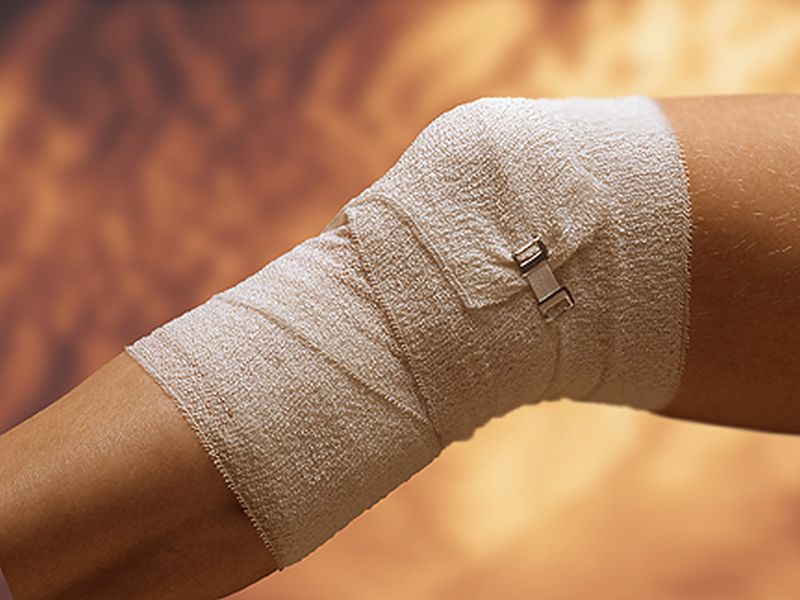An E. coli strain found in fresh chicken and turkey products can cause serious UTIs.
Illnesses Linked to McDonald's Salads Reach 507 Cases in 15 States and NYC: FDA

For the study, investigators analyzed chicken, turkey and pork purchased from every major grocery chain in Flagstaff, Ariz. They also collected and analyzed urine and blood samples taken from patients at Flagstaff Medical Center.THURSDAY, Aug. 30, 2018 (HealthDay News) -- An E. colistrain found in fresh chicken and turkey products can cause serious urinary tract infections( UTIs) in people, researchers say.
E. coli was found in about 80 percent of the nearly 2,500 meat samples and in 72 percent of the urine and blood samples from patients who tested positive for infection, the study authors said. E. coli ST131 was the most common type infecting people and was also present in the meat samples.
In the next phase of the research, the investigators discovered that almost all of the E. coli ST131 on the poultry products was a strain called ST131-H22, and that it carried genes that help E. coli thrive in birds. This same strain was also found to be causing UTIs in people.
The findings indicate that E. coli in fresh poultry can be passed to people, causing UTIs. While many people believe these common infections are a minor problem, invasive UTIs that involve the kidneys or blood can be life-threatening, the study authors said.
More than 80 percent of UTIs are caused by E. coli, but only a few strains cause the most serious infections. That includes E. coli ST131, which kills thousands of people in the United States each year, according to the researchers.
"In the past, we could say that E. coli from people and poultry were related to one another, but with this study, we can more confidently say that the E. coli went from poultry to people, and not vice versa," said study leader Lance Price. He is director of the Antibiotic Resistance Action Center at George Washington University in Washington, D.C.
These findings highlight the importance of cooking poultry thoroughly and handling it carefully in the kitchen, said Price, who noted that poultry products are not routinely tested for E. coli strains that can cause UTIs.
"We are now working to measure what proportion of UTIs might be caused by foodborne E. coli by looking at all E. coli strains, not only ST131," Price said in a university news release. "This is not an easy question to answer, but an extremely important one."
The study was published online Aug. 28 in the journal mBio.
-- Robert Preidt
 Copyright © 2018 HealthDay. All rights reserved.
CONTINUE SCROLLING FOR NEXT NEWS ARTICLE
SOURCE: George Washington University, news release, Aug. 28, 2018
Ancient Treatment May Help Fight 'Superbugs'

WEDNESDAY, Aug. 29, 2018 (HealthDay News) -- A certain type of clay appears effective against disease-causing bacteria in wounds, including some that are antibiotic-resistant, researchers say.
In some cultures, wet clay or mud is used as a skin treatment or poultice, and the use of mud as medicine stretches far back in human history.
"We showed that this reduced iron-bearing clay can kill some strains of bacteria under the laboratory conditions used, including bacteria grown as biofilms, which can be particularly challenging to treat," said study senior author Dr. Robin Patel. She is a clinical microbiologist and infectious diseases specialist at the Mayo Clinic in Rochester, Minn.
Biofilms, which occur when bacteria develop a film or protective coating that increases their resistance to antibiotics, appear in two-thirds of the infections seen by doctors, the study authors explained in a Mayo Clinic news release.
According to Enriqueta Barrera, program director of the National Science Foundation's Division of Earth Sciences, "This study is an important advance in understanding how clays, specifically blue clay from Oregon, have shown medicinal properties by attaching to pathogenic bacteria."
The foundation funded the study, which was published online recently in the International Journal of Antimicrobial Agents.
The study authors noted that the findings are preliminary. They also cautioned that not all types of clay are beneficial. Some may help bacteria grow.
-- Robert Preidt
 Copyright © 2018 HealthDay. All rights reserved.
CONTINUE SCROLLING FOR NEXT NEWS ARTICLE
SOURCE: Mayo Clinic, news release, Aug. 21, 2018
Salmonella Outbreak in 4 States Linked to Kosher Chicken: CDC
One person has died and 16 others sickened in a four-state salmonella outbreak linked to kosher chicken, U.S. health officials say.
Illnesses began between Sept. 25, 2017 and June 4, 2018, and the Centers for Disease Control and Prevention began investigating the outbreak in late June after after the New York State Department of Health found that several ill people reported eating kosher chicken.Cases have been reported in Maryland, New York, Pennsylvania and Virginia. Eight people have been hospitalized, including one patient who died in New York.
Tests revealed that some kosher chicken products are contaminated with salmonella, and several ill people said they'd eaten Empire Kosher brand chicken. The outbreak strain was identified in samples of raw chicken collected from two facilities, including one facility that processes Empire Kosher brand chicken, the CDC said.
The investigation is ongoing, the CDC said.
People become sick from salmonella 12 to 72 hours after swallowing the germ and develop diarrhea, fever, and stomach cramps. Most people recover within a week, but some cases last longer and are more severe.
Always cook raw chicken, including chicken breasts, whole chickens, and ground chicken, to an internal temperature of 165 degrees Fahrenheit to prevent food poisoning. Use a food thermometer to make sure, the CDC advised.
Thoroughly wash hands, counters, cutting boards, and utensils with warm, soapy water after they're in contact with raw chicken. Use a separate cutting board for raw chicken and other raw meats to avoid contaminating fruits, vegetables, and other food that won't be cooked before being eaten.
Don't wash raw chicken before cooking. Doing so can spread chicken juices in the kitchen and contaminate other food, utensils, and countertops, the CDC said.
 Copyright © 2018 HealthDay. All rights reserved.
CONTINUE SCROLLING FOR NEXT NEWS ARTICLE
Two Ebola Patients Who Received Experimental Treatment Have Recovered: Congo Officials
Two of the first 10 people to receive an experimental Ebola treatment have recovered from the highly dangerous disease, Congo's health ministry says.
The patients received a treatment called mAb114, which was isolated from a survivor of an Ebola outbreak in 1995. It was the first of five experimental treatments Congo approved for use in a new outbreak that was declared on Aug. 1, the Associated Press reported.
The other experimental treatments are ZMapp, Remdesivir, Favipiravir and Regn3450 - 3471 - 3479.
More than 3,400 people have received an experimental Ebola vaccine in this outbreak.
On Saturday, the head of the World Health Organization praised Congo officials for making the experimental treatments available, calling it "a global first, and a ray of hope for people with the disease," the AP reported.
To date, there have been 79 confirmed cases in the outbreak, including 42 deaths and 14 patients who have recovered. There are another 28 probable cases.
This is Congo's tenth Ebola outbreak. The disease can be fatal in up to 90 percent of cases, depending on the strain.
 Copyright © 2018 HealthDay. All rights reserved.
CONTINUE SCROLLING FOR NEXT NEWS ARTICLE
Health Tip: Avoid a Pinworm Infection
(HealthDay News) -- Pinworms are thin and white and typically measure 1/4 inch to 1/2 inch in length.
An infection, which can be treated with an antibiotic, typically occurs among school-age children.Female pinworms lay thousands of eggs while the infected person sleeps. They can cause anal itching or have no virtually no symptoms, the Mayo Foundation says.
- Wash in the morning, since pinworms lay their eggs at night. Showering can be more effective than taking a bath in preventing a pinworm infection.
- Change underwear and bed sheets daily.
- Wash clothing, towels and bedsheets in hot water and dry on high heat.
- Don't scratch the anal area.
- Trim your child's fingernails so there's less space for eggs to collect.
- Discourage nail biting.
- Wash hands thoroughly after having a bowel movement and before eating.
 Copyright © 2018 HealthDay. All rights reserved.
CONTINUE SCROLLING FOR NEXT NEWS ARTICLE
Illnesses Linked to McDonald's Salads Reach 507 Cases in 15 States and NYC: FDA
The number of confirmed cases of Cyclospora infection linked to salads from McDonald's restaurants was 507 in 15 states and New York City as of Aug. 23, the U.S. Food and Drug Administration said Friday.
The source of the intestinal parasite was a Fresh Express salad mix used at McDonald's restaurants in the affected states. McDonald's says it stopped using the Fresh Express salad mix on July 13 and has replaced the supplier of salads in those states.
Anyone who consumed salads from McDonald's in IL, IA, IN, WI, MI, OH, MN, NE, SD, MT, ND, KY, WV, and MO could have been exposed to the parasite, the FDA said.
Also possibly at risk are people who ate beef, pork and poultry salad and wrap products distributed by Caito Foods LLC, of Indianapolis. The products were produced between July 15 and 18, 2018, with either "Best By," "Enjoy by," "Best if Sold By" or "Sell By" dates ranging from July 18 through July 23, 2018.
Caito Foods was told by Fresh Express that the chopped romaine in these products was being recalled due to possible Cyclopsora contamination.
Most people Cyclospora infection (cyclocyclosporiasis) develop diarrhea, loss of appetite, weight loss, stomach cramps/ pain, bloating, increased gas, nausea, and fatigue. Vomiting, body aches, headache, fever, and other flu-like symptoms may occur, the FDA said.
Some people who are infected with Cyclospora do not develop any symptoms.
If not treated, the illness may last between a few days to a month or longer. Symptoms may seem to go away and then return one or more times.
People with symptoms of cyclocyclosporiasis should contact their health care provider, the FDA said.
It's continuing its investigation into the outbreak.
 Copyright © 2018 HealthDay. All rights reserved.
|
মন্তব্যসমূহ
একটি মন্তব্য পোস্ট করুন